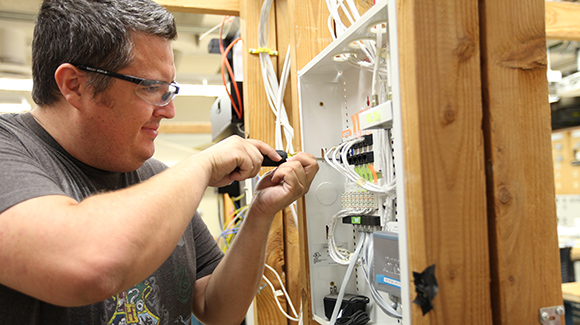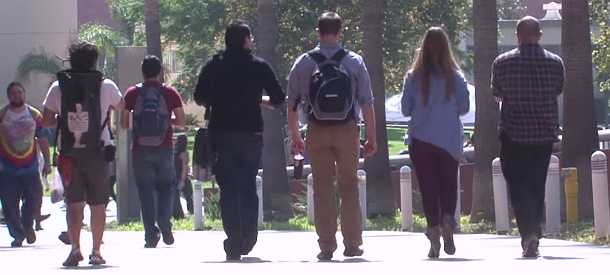
California Community Colleges unveil their career education stars
California Community Colleges are recognizing 100 programs at 65 colleges for their outstanding efforts in student success that have increased their earning power and social mobility.
Strong Workforce Stars is a new, annual celebration for innovative career education programs that equip students with certificates, degrees or credentials and skills valued in the labor market, all in an effort to add one million more middle-skilled workers in California.
To receive a Star designation, career education programs have to meet one or more of the criteria below:
- 50 percent or more increase in student earnings
- 70 percent or more students attain a regional living wage
- 90 percent or more students report that their job is close or very close to their field of study
In 2016, the state of California infused $200 million to the budget to spur more and better career education across the 114 community colleges of California. In the second year of the program, one-sixth of the dollars must be allocated based on contribution to student success outcomes – like those above – rather than the traditional approach of student enrollment. Strong Workforce Stars is one way to track progress toward that goal.
Special shout out to the programs that received two stars: San Mateo College’s Electrical Power Systems and Instrumentation Certificate and Entrepreneurship, Skyline College’s automotive technology program, Cuyamaca College’s Wasterwater Management and Environmental Health and Safety programs, and San Joaquin Delta College’s RN, Psychiatric Technician, Radiologic Technology, and Speech Language Pathology programs.
Find out if a college in your region received a Strong Workforce Star.
In addition, the Strong Workforce Rising Stars program will be coming out soon, to highlight the career education programs with significant potential to meet the Strong Workforce Stars criteria. Stay tuned!
——————————————————————————–

Kern County REDPIN Participants (L-R): Lisa Gilbert, KCSOS; City of Bakersfield Mayor Karen Goh, Cheryl Scott, KEDC; Teresa Hitchcock, Kern County Workforce Development; Gene Voiland, Valley Republic Bank; Kristen Beall-Barnes, Kern Community Foundation & Richard Chapman, KEDC.
California represented in new rural economic development network
California’s Central Valley is representing the state in the Rural Economic Development Philanthropy Innovators Network (REDPIN), a new initiative developed in partnership by the Center for Rural Entrepreneurship and the Aspen Institute that focuses on philanthropy’s role in economic development.
Spearheaded by the Kern Community Foundation, the team from Kern County represents the only California community and is the only one west of Kansas to be a part of the initiative. Nine communities in total were chosen in the United States through a competitive grants process.
The team consists of representatives from the City of Bakersfield and the Bakersfield Mayor’s Office, the County of Kern's Workforce Development department, Kern Community Foundation, Kern County Superintendent of Schools, Kern Economic Development Corporation and Valley Republic Bank.
REDPIN is an 18-month peer-learning network that explores philanthropy’s role in rural economic development. The purpose is to expose participant communities to a range of economic development practices and develop community-wide efforts to improve local economies. Teams will analyze their economic development practices and apply current tools and research to improving their efforts, especially for low-income families.
Kern’s team believes that the development of a Kern Education Pledge, which is focused on increasing the educational achievement and college-career pathways, will be the most effective strategy to improving rural economies in Kern County.
For more information, contact Dr. Kristen Barnes at Kristen@kernfoundation.org or Dr. Rob Arias at roarias@kern.org.
| ——————————————————————————– |
Toolkit promotes student success for formerly incarcerated students
Corrections to College California released a toolkit for colleges and universities seeking to foster success for formerly incarcerated students. The toolkit is based on input from students, faculty, administrators and staff on campuses throughout the state, and is split into three sections:
- Essential Program Elements and Services details how a campus can fully implement a program to support formerly incarcerated students.
- Informal Strategies identifies a number of specific no-and low-cost steps that can be taken to support formerly incarcerated students while the campus is building a fully implemented program.
- Student Perspective synthesizes the input of many formerly incarcerated students and graduates about what they want and what advice they would give to upcoming students.
Corrections to College California is a project of Renewing Communities, a joint initiative of The Opportunity Institute and the Stanford Criminal Justice Center.
————————————————————

FREE WEBINAR: The California Economic Summit invites you to learn about two innovative strategies and a mobile app that are successfully preparing students to harness the power of the storm to succeed in the workforce and life.
When? August 2 at 11 AM (PT)
————————————————————
WORKFORCE NEWS
Effort to improve pathways takes aim at data-sharing challenges
The Workforce Pathways Joint Advisory Committee met earlier this month to talk about sharing data and to recommend a set of principles to support the improvement and development of high quality college and career pathways in California.
Linking data across segments is not always as easy as it sounds. Chief Instructional Officer Patrick Perry from the California State University Chancellor’s Office walked the group through this challenge, which starts with conflicting methods of identification.
California's K-12 system uses the State Student Identifier (SSID) system to maintain data on individual students. Community College has unique system identification and collects social security numbers. CSU has multiple system identification numbers and collects SSN, while UC and the Employment Development Department (EDD) only collect SSN.
Currently, any sharing of data is done mainly by using the SSN. This leaves out people that do not have or did not provide a SSN and makes it problematic to match with K-12.
Community Colleges are taking the first step towards a solution by allowing their application to look up the student’s SSID during the application process to create a data crosswalk between K-12 (CDE) and CCC. The CSU system will be the next to implement this cross over.
The goal of all of this work is to be able to gather better wage data and be able to not only track students from K-12 to college, but also those who do not attend college after high school. The Community Colleges, through the Salary Surfer tool, are already focused on tracking the wage data of their students two years prior to earning a degree and at two and five years post-completion.
This is one aspect of using data and metrics to inform the quality of CTE programs and career pathways. For students, it's important to find out if they are being successful during transitions between institutions and to go on to earning living wage after graduation.
To benefit the regional economy, a better understanding of labor market data should go hand-in-hand with learning whether or not employers are hiring local graduates and are they satisfied with their skills.
The more knowledge and data sharing that can occur between institutions, the stronger our local and regional communities and economies.
Subscribe to the Workforce Essentials newsletter from the California Economic Summit and receive valuable, shareable workforce news and tools like these. SUBSCRIBE TODAY



